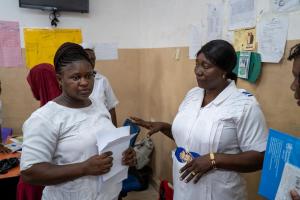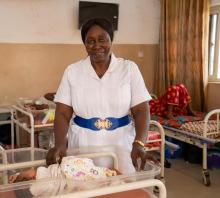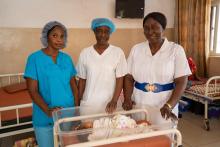WHO’s capacity building program strengthens health workforce at the Maternal Health Unit in Rokupa Government Hospital.
When Margaret Titi Sesay, a beneficiary of the WHO capacity building program on the use of the Integrated Obstetric Care guidelines, was posted to the Maternal and Child Health Care unit of Rokupa Government Hospital in 2020, the monthly maternal deaths were worrying. On average, the hospital recorded three to four maternal deaths per month, which was a big concern for the community, government, and hospital authorities.
In 2023, data obtained from the Monitoring and Evaluation team of Rokupa Government Hospital showed that three mothers had lost their lives while giving life, a number Margaret says is still far too high. "We love to see zero maternal death in a year," she says.
Sierra Leone has one of the highest rates of maternal mortality in the world, with 443 mothers dying for every 100 000 live births as of 2020 (UNMMEIG, 2020), and although this figure reduced drastically over the past 20 years from 1682/100,000 in 2000 to 443/100,000, the country is still losing far many mothers in the process of giving life.
To help reduce the number of deaths among mothers, WHO supported the Ministry of Health Sierra Leone to develop and disseminate the National Integrated Obstetric Care (Preconception, Antenatal Care, Intrapartum, and Postnatal Care) guidelines that bring together new and existing recommendations to promote the quality of pre-pregnancy, pregnancy, labour, and childbirth care. To ensure the use of the guidelines, WHO further supported the capacity building of at least two healthcare workers from each facility in the Western Area and Bo district that provide maternity care. Matron Margaret from Rokupa Government Hospital, located in the Western Area and home to nearly 1.5 million people, was one of the beneficiaries of this capacity building.
Margaret says that the training enhanced her mentorship, supervision, and engagement skills with her staff, a boost that has seen the monthly death rates curbed. "I monitor, mentor, and supervise nurses and midwives and, in the process, make immediate corrections during my routine supervision inwards as well conduct onsite mentorship,” said, Margaret.
“One of the most incredible things from the workshop was engagement with staff and the patients. Over time, keeping my lines open at any time of the day and night has saved many mothers. Even in the night, I work with the night duty nurses, offering support when situations are critical and sometimes even using videos to work through the most vital and challenging conditions to save mothers and their babies. We made quick decisions. But most importantly, the guidelines provided by WHO have played a critical role in guiding midwives at Rokupa Government Hospital,” said Margaret.
“When we receive new midwives, I attach them to an old one for mentorship and guidance on handling mothers and allow them to only work during the day until they can work at night. The midwives and nurses are doing a tremendous job. We are working hard not to go back to the previous state. We sit down as a team and agree on how to manage the team, and we have the guidelines for managing the cases,” she added.
Margaret also ensured the improvement in respectful maternity care following the training by advocating for and erecting screens to increase women's confidence in the hospital.
Margaret is thankful and happy to be saving lives and helping to bring life to the world; her biggest lesson is to be alert, receive every call for help with high regard, and support the Midwives with decision-making, which is timely to save lives. On Maternal death accountability, Magaret says to take every death seriously, investigate and work with the Midwives to address the issues that lead to death, and ensure that it does not repeat.
The training was made possible through the support of the Swedish International Development





